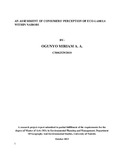| dc.description.abstract | The present study assesses the decision making process of the consumer amidst efforts by a number of companies to adopt eco friendly value addition in Kenya as part of concerted initiatives towards environmentally sustainable consumption. A growing number of consumers are beginning to bias their demand towards environmentally safe products, and in this respect companies are adopting ecolabels on their products to satisfy this consumer interest. Ecolabel, being a communication tool, is used to inform consumers that a product is more environmentally friendly relative to other products in the same category.
The study aimed at assessing the importance attached to the environment as a criterion in purchasing decisions and assessing consumer recognition of ecolabels. The study also sought to assess the impact of selected consumer characteristics such as age, sex, and education on consumer recognition of eco-labels. In order to achieve these objectives, the study has attempted to determine consumers’ response to ecolabels using selected deodorant products as a case study. Deodorants products were chosen as a case study because of the variety of ecolabels found on their packaging. The differentiation in shoppers profiles was based upon differences in house rent prices in the three locations. The study was carried out within Nairobi in three locations in order to make comparisons. Tuskys Eastlands was chosen to represent a profile of shoppers in Eastlands. Nakumatt Westgate was chosen to give a profile of shoppers in Westlands, and Tuskys Imara was chosen to give a cross section of shoppers and to represent centrality.
Extensive literature was reviewed including an overview of the relationship between environmental awareness of ecolabels and sustainable consumption, NEMA directives on promoting a green economy, and typology of ecolabels presently in use in Kenya. Previous literature has examined the impact of consumers demographic characteristics on their decision to purchase environmentally friendly goods. There are no studies examining the influence of these characteristic on ecolabel recognition as in this study. Data gathering techniques involved questionnaire being filled by randomly sampled consumers entering the selected supermarkets. A total of 138 (N=138) respondents were sampled; 60 respondents from Tuskys Imara, 48 from
XIII
Tuskys Eastlands, and 30 from Nakumatt Westgate. The key variables that were used for analysis were age, sex, and education of the respondents, and differences based on geographical location of the supermarket. The results revealed that there was a high level of environmental awareness when buying deodorants in all three locations. Environment appeared to be an important criterion in purchasing decisions. Using a chi square test at (alpha=0.05) on age, sex, education and geographical location there was no significant difference in consumer recognition of labels. All consumer characteristics do not distinguish consumer recognition of ecolabels. The Spearman’s rank correlation co-efficient test revealed a high positive co-efficient of correlation (rs = .978) between environmental consideration when shopping and recognition of labels. Consumers with a higher level of environmental consideration are likely to recognize ecolabels more often when buying than those with low environmental consideration. It was established that brand and price were often highly prioritized, at 77.2 % and 72.8% respectively as compared to environmental impact of the content and packaging at 53.7% and 52.9% respectively when buying deodorant. 69% of the respondents were influenced by label information in their buying decisions hence this proportion would choose to buy or not depending on the label information. Only 42.7% of the respondents reported to trust environmental label information on deodorants while 88.4% of the respondents reported that it was important that manufacturers are inspected for claims of environmentally responsible production.
The study recommends a comprehensive eco certification scheme in consultation with business industry and relevant Non Governmental Organizations (NGO). This would greatly benefit both corporate and the individual consumer. The study also recommends amplification of environmental friendly aspects of products in advertising and packaging. This study will be of interest to companies hoping to adopt ecolabeling schemes as part of their marketing strategy. It gives an insight to Nairobi consumers’ environmental consideration. This research is important for environmental management because it provides a depiction of the importance attached to environment as a criterion in purchasing decisions. This is useful in making policies towards sustainable consumption. | en |

